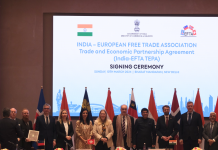Blockchain technology has ushered in a new era of transparency, accountability and efficiency in business, says Paul Brody, EY’s Global Blockchain Leader, in a freewheeling chat with Muhammed Nafie
When Paul Brody joined EY as the Americas strategy leader for technology sector in 2015, the big-four accounting giant was in the nascent stage of building a dedicated blockchain team. Having moved in from IBM where he was instrumental in developing a new Internet of Things architecture, Brody was known for evangelising the use of blockchain. One of the first things he did at EY was to convince the company’s global executive and senior leadership about the huge potential of blockchain, a technology which he believes could trigger chain reactions across business models, business processes, supply chains and customer relationships throughout the global economy.
It’s been four years now since EY formally set up its global blockchain team, with Brody at the helm and largely focused on four vital areas: audit, tax, business consulting and the core blockchain technology. “Blockchain technology holds tremendous promise to bring in a new era of transparency, accountability and efficiency in business,” he observes. “EY makes sure that its clients can transact on blockchain with transparency, accountability, efficiency and regulatory compliance. I am working to make sure that happens and, in particular, to ensure that open, decentralised and truly public blockchains are successful.”
Transforming business ecosystems
Brody says blockchain is going to be transformational for companies, adding that the technology will do for networks of enterprises and business ecosystems what enterprise resource planning (ERP) did for a single company.
During the last 30 years, companies have been transforming their internal business processes through ERP systems. But today it’s much more important for them to manage and interact with their external partners. However, there is no equivalent set of capabilities for external business collaboration just like they had ERP for internal process. Blockchain bridges that gap. It allows companies to work together with shared facts, shared business processes, without having to hand over strategic information to an industry portal or an intermediary.
“Blockchain will integrate information and process within and across enterprise boundaries and has the potential to streamline and accelerate your business processes, increase protection against cyber security and reduce or eliminate the roles of intermediaries,” Brody says.
While addressing the security concerns, he compares the current stage of blockchain to the early stages of the internet when people were not very comfortable with using it for business because it was an uncontrolled network. But now with privacy and regulatory compliance being secured, people are now increasingly using internet for business. He says it’s going to be the same for the public blockchain when it’s equipped with privacy and regulatory compliance.
Private versus public
EY is also investing heavily in developing core blockchain technologies. “The big focus area for us has been to build our privacy technology for blockchain so that clients can do fully private, regulatory-compliant transactions over public blockchain networks,” he adds.
Although he recognises that private blockchains still dominate the sector and enterprises often prefer a private blockchain as it offers more control, Brody says there has been a significant shift recently from private to public blockchain. “Two-three years ago, every company you talked to wanted to implement private blockchain. Now they understand that private blockchain is not going to work for them very well. We did a survey last year and 75 per cent of the companies who built private blockchain now believe that when they do it for another activity it should be on the public blockchain.” He strongly believes that one global public blockchain helps deliver on the kind of vision EY has.
Win-win partnership
Brody’s vision for EY is to be the world’s leading blockchain software company. Tech giant Microsoft is one of the strategic blockchain partners of EY in managing Xbox video game licenses. Brody claims that they process millions of transaction per day from thousands of video game developers. “The partnership with Microsoft is our most important partnership for a couple of reasons. First, they are the biggest client in the world of blockchain. It always makes me incredibly proud to say that we sell software to Microsoft. They are one of the world’s biggest software companies and they like our software and blockchain enough to buy form us. This is very flattering.”
He adds, “We are working on the Xbox video games system. The separation of our roles is very complementary. The Microsoft is working on how to host blockchain notes in very large numbers and scale and how to make it easy to develop on blockchain systems in the outer cloud, while we are working to make secure transactions move very quickly with lots of complexities and sophistications in a blockchain environment. We are providing the business logic and application logic while Microsoft is engineering the infrastructure. It’s a win-win partnership and the outcome is one of the world’s highest volume business transaction blockchains.”
Regional prospects
When we caught up with him at EY’s Oman office on a Thursday morning, Brody was gearing up for a number of meetings lined up throughout the day. Therefore, to our questions about the potential opportunities in Oman, he replied candidly, “You are catching me on the first morning of my first day here. So this might be a question you might be more successful of asking at the end of the day. That being said, we have a great series of conversations lined up. Since we have our digital security operation centre here in Oman one of the things we may end up doing here will be building some security capabilities here to serve the entire region and other parts of the world.”
Mohamed Nayaz, advisory partner at EY Oman chimed in saying that although blockchain is in a very nascent stage in Oman, the government of Oman is looking at the technology seriously. The State General Reserve Fund (SGRF) has announced the establishment of the nation’s first blockchain company in 2017. He informs the potential industries for blockchain are health care and financial services as well as the government sector where some actions are already taking place at the current stage.
Brody who arrived in Oman after a hectic schedule in Saudi Arabia and the UAE is very optimistic about the prospects of blcochain in the region. He says there are quite a lot of public sector activities around blockchain in the region. The purpose of his visit to the region include engaging with the clients, figuring early stage projects and ramping up the team etc. “We are stepping up our engagement here. I think now we have a better sense of the solution, and we are more confident that we can meet the regulatory requirement. And this is the good time for us to speeding up the project here,” he says.
He exudes confidence that over a time EY will have a blockchain team in the Middle East region. As a global team, EY has a common set of technology platform but each region has some local area of expertise. Italy has the expertise on food traceability while the US team is built on the expertise on supply chain and software management. The UK team is very strong on encryption. Likewise, Brody says, the Middle East region has the potential to become the hub of oil and gas blockchain to serve the entire global operations.






